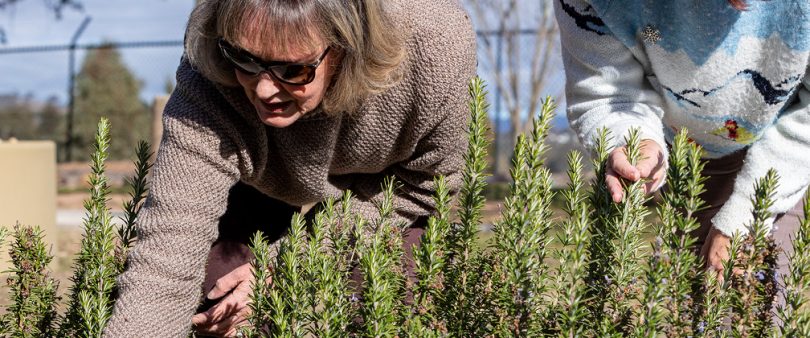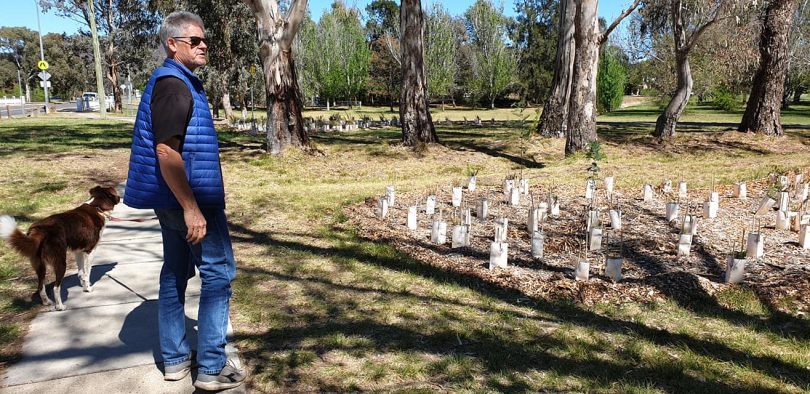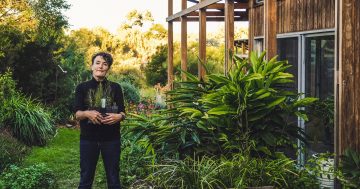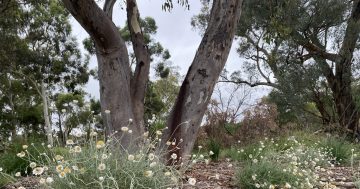
Community groups will be better equipped to help care for their local parks and open spaces as part of the Adopt-a-Park program. Photo: ACT Government.
A bee-friendly village at Hall is one of 32 projects to receive funding from the ACT Government under the Adopt-A-Park Community Grants Program.
Across the ACT, 32 projects will share $183,989 to contribute to the amenity and improvement of the ACT’s neighbourhood parks and places.
Jonathon Palmer and Leigh Crocker from the ‘Hall Honeys’ community group have created quite a buzz around their project to make Hall a bee-friendly community that fosters better bee health.
More than 100 native ‘bee hotels’ have been installed in the village and district. The bee hotels are timber blocks with bee-sized holes drilled in them to allow bees to lay their eggs.
‘Hall Honeys’ convenor Palmer said bees are in serious trouble due to loss of habitat and food sources, along with the use of pesticides and diseases such as the varroa mite.
“It is proposed that Hall Village will be part of a movement to counter this by becoming a bee-friendly community, one that is aware and engaged in fostering bee health,” Mr Palmer said.
Minister for City Services Chris Steel said the Adopt-A-Park program means more volunteer community groups will be better equipped to help care for and complete projects in their local parks and open spaces. The grants are made possible through levies on businesses in the city centre.
“We’re really pleased that 32 really diverse projects have been funded, from creating new gardens and micro forests through to bee hotels and supporting local shopping centres with new plantings. It’s fantastic that we’ve been able to support this many projects across the community,” Mr Steel said.
Among other successful applicants, the Downer Community Association received a grant of $15,000 for more than 1500 plants that will create its own micro-climate at the park at Cole Street in Downer.
Through a crowdfunding initiative, The Climate Factory and the Downer ParkCare group also raised $20,000 to build the pilot micro-forest at Downer, with more than 180 individuals and businesses supporting the project.
The money will pay for community engagement, development of a landscape sketch plan, soil improvement, 1500 climate-ready native trees, shrubs and groundcovers and a water cart to keep plants watered during the establishment phase. The Downer ParkCare group will maintain the space and will have a say about other features they would like to see in the park.

The proposal to reinvigorate the parkland at Downer. Image: The Climate Factory
They also received a grant to build a climate-wise edible micro-forest in Braddon. Two large wicking beds, each with a reservoir of 110 litres will be planted with a variety of climate-ready edible trees, shrubs and groundcovers. The Climate Factory will also run free workshops on creating edible gardens in containers, which will be announced on their Facebook page and website.
Landscape architect and founder of The Climate Factory, Edwina Robinson, said planting trees is one of the simplest things to address hotter, drier climates.
“Trees cool the environment, provide habitat, absorb carbon and improve property values,” Ms Robinson said.

The birdscaping park located on a rarely-used piece of urban open space in O’Connor. The project was designed to attract small threatened native birds (like the Scarlet robin) and insects back into the suburbs. Photo: The Climate Factory Facebook.
Mr Steel said there were 45 applications for the Adopt-a-Park grants.
With co-contributions from the successful applicants factored in, the program will generate a $390,572 investment in community stewardship of public green space by the Canberra community.
The program aims to support existing groups and encourage new ones to form. Before the Adopt-a-Park program was announced there were 35 active groups registered with the Urban Parks and Places volunteer program, providing more than 2000 hours of volunteer work during the past five months.
“We’re pleased the program is supporting an increase in active groups to 46, encouraging volunteers to get involved,” Minister Steel said.
Groups that haven’t been supported can get in touch with the ACT Government to undertake local projects to plant new trees and undertake landscaping.
A full list of successful applicants is available from City Services.















